《新视野》预备级第1册Unit 5教案
【VIP专享】新视野大学英语第三版第一册Unit 5教案
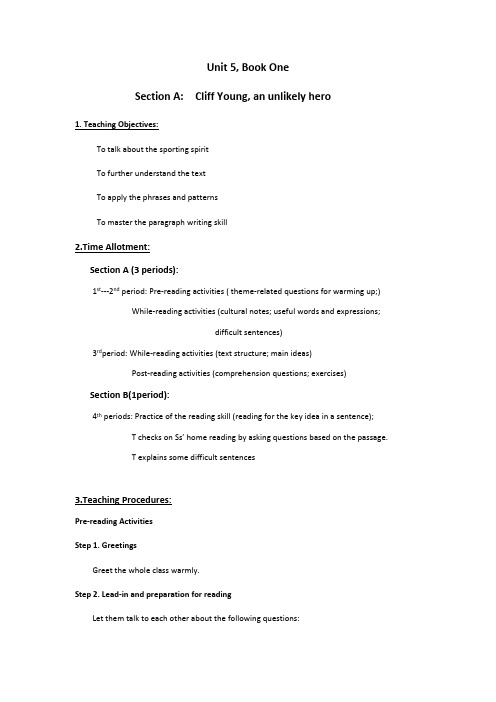
Unit 5, Book OneSection A: Cliff Young, an unlikely hero1. Teaching Objectives:To talk about the sporting spiritTo further understand the textTo apply the phrases and patternsTo master the paragraph writing skill2.Time Allotment:Section A (3 periods):1st---2nd period: Pre-reading activities ( theme-related questions for warming up;) While-reading activities (cultural notes; useful words and expressions;difficult sentences)3rd period: While-reading activities (text structure; main ideas)Post-reading activities (comprehension questions; exercises) Section B(1period):4th periods: Practice of the reading skill (reading for the key idea in a sentence);T checks on Ss’ home reading by asking questions based on the passage.T explains some difficult sentences3.Teaching Procedures:Pre-reading ActivitiesStep 1. GreetingsGreet the whole class warmly.Step 2. Lead-in and preparation for readingLet them talk to each other about the following questions:1. What sports do you like doing?2. How much time do you spend on sports every day?3. Do you think playing sports is important to students? Why?Step 3. Fast readingAsk the Students to read the passage as quickly as they can and then answer the questions on the screen. Let them get the main idea of each paragraph and make clear about the text structure.Text structure: ( structured writing ) The passage can be divided into 3 parts.Part1 (para.1-10) Cliff Young took part in the Australian marathon in 1983 and finally won it.Part 2 (para.11-13) Cliff Young’s life after the race of 1983Part 3 (Para.14) Cliff Young sets a good example for other people.Purpose: Improve the students’ reading and writing ability and understand the general idea of each paragraph.Method:Read the text individually and talk in groups; Use task-based language teaching method, reading approach, communicative approach and total physical response method.Step 4. Preparation for details of the text on the screenStudents are required to look at the Words and Phrases on the screen and give a brief presentation in class.Words and Phrases:Purpose: Train the Students’ ability of understanding and using foreign language.Method:Talk in groups, Use task-based language teaching method, communicative approach and total physical response method.1. (Para.1) up to 达到;至多The Olympic Stadium will hold up to 80,000 spectators.奥林匹克体育场将可容纳多达8万观众。
新视野大学英语读写教程 第三版 第一册 Unit 5 教案资料
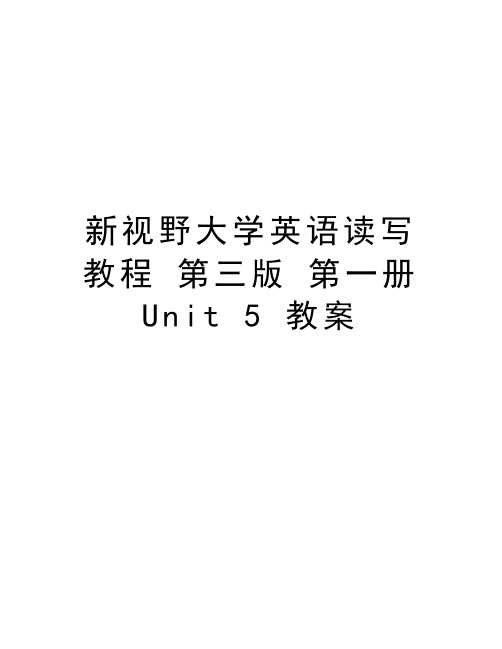
Step 1. Greetings
Greet the whole class warmly.
Step 2. Lead-in and preparation for reading
Let them talk to each other about the following questions:
Part2(para.11-13)Cliff Young’s life after the race of 1983
Part3(Para.14)Cliff Young sets a good example for other people.
Purpose:Improve the students’ reading and writing ability and understand the general idea of each paragraph.
教学方法与手段
1. lecture and explanation
2. discussion and retelling
3.PowerPoint
4.deduction
教学的基本内容
Unit5Section A:Cliff Yedures:
Text structure: ( structured writing )The passage can be divided into 3 parts.
Part1(para.1-10)Cliff Young took part in the Australian marathon in 1983 and finally won it.
Ask the Students to read the passage as quickly as they can and then answer the questions on the screen. Let them get the main idea of each paragraph and make clear about the text structure.
Unit 5新视野大学英语 教案
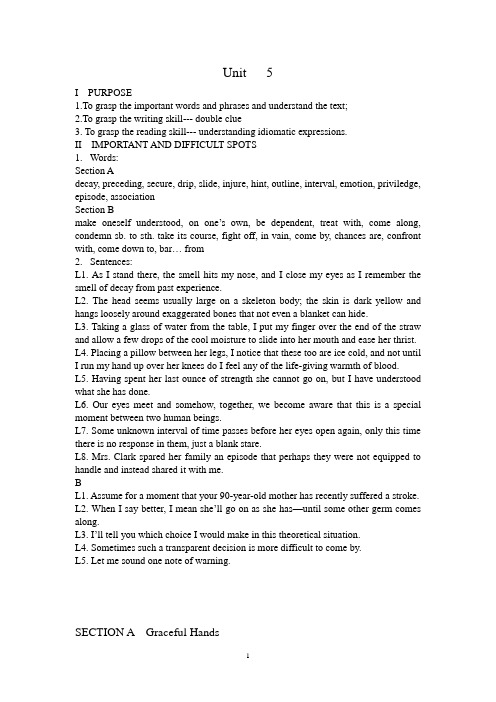
Unit 5I PURPOSE1.To grasp the important words and phrases and understand the text;2.To grasp the writing skill--- double clue3. To grasp the reading skill--- understanding idiomatic expressions.II IMPORTANT AND DIFFICULT SPOTS1.Words:Section Adecay, preceding, secure, drip, slide, injure, hint, outline, interval, emotion, priviledge, episode, associationSection Bmake oneself understood, on one‟s own, be dependent, treat with, come along, condemn sb. to sth. take its course, fight off, in vain, come by, chances are, confront with, come down to, bar… from2.Sentences:L1. As I stand there, the smell hits my nose, and I close my eyes as I remember the smell of decay from past experience.L2. The head seems usually large on a skeleton body; the skin is dark yellow and hangs loosely around exaggerated bones that not even a blanket can hide.L3. Taking a glass of water from the table, I put my finger over the end of the straw and allow a few drops of the cool moisture to slide into her mouth and ease her thrist. L4. Placing a pillow between her legs, I notice that these too are ice cold, and not until I run my hand up over her knees do I feel any of the life-giving warmth of blood.L5. Having spent her last ounce of strength she cannot go on, but I have understood what she has done.L6. Our eyes meet and somehow, together, we become aware that this is a special moment between two human beings.L7. Some unknown interval of time passes before her eyes open again, only this time there is no response in them, just a blank stare.L8. Mrs. Clark spared her family an episode that perhaps they were not equipped to handle and instead shared it with me.BL1. Assume for a moment that your 90-year-old mother has recently suffered a stroke. L2. When I say better, I mean she‟ll go on as she has—until some other germ comes along.L3. I‟ll tell you which choice I would make in this theoretical situation.L4. Sometimes such a transparent decision is more difficult to come by.L5. Let me sound one note of warning.SECTION A Graceful HandsPART ONE(PRE-READING / WARM-UP / THINK ABOUT IT (LISTEN AND TALK))If you were given this decision to assist in your family member‟s death, what are the challenges you might face?PART TWO(A GENERAL PRACTICE ON THE PASSAGE)Why was the word “graceful” used to describe the grandmother?PART THREE A Detailed Study of the PassagePart I1. precede (para.1, line2) : be earlier than; come or go just in front ofeg. 1). The week that preceded May Day last year has seen days of heavy downpour in that country.2). He came into the room preceded by a small dog.2.reach for (para.1, line4) stretch one‟s hand inorder to touch or takeeg. The shopkeeper reached for a packet of tea.3. lie motionless (para. 3. line 1): lie belongs to a movement verb, often followed by an adj. participle. The verb like this are: come, go, stand, run, etc. “Stand still” (para7. L1)eg. 1). He came running.2). He went to bed tired and hungry4. sunk (para.3, L4): (only before noun) having fallen into the bottom of the sea; built or placed at a lower level than the surrounding floor, grounds, etc.sunken treasure 沉在海底的宝藏sunken bath 低于地面的浴缸sunken garden 低洼的花园sunken cheeks/eyes 凹陷的双颊/双眼5. feel for (para.4, line1): search with hands, feet, astick, etc. // feel sympathy for sb.eg. 1) . He felt in his pocket for his key.2). Blinded by the soap, he had to feel for his glasses.3). I really feel for the parents of that little boy who was killed.6. ease (para.4, line7): make a progress, easy 使容易, 使顺利eg. This new drug can ease childbirth for women.(Cf) with ease, at ease7. manage to do (para.4, line10): try hard to do sth. difficulteg. 1). The box is heavy, but I can manage to carry it upstairs.2). John managed to accomplish his work in time.Part II8.go about (para.5, line1) : set abouteg. How shall we go about the job ?9. provide for (para.5, line1) : prepare foreg. 1) Can people provide for unexpected events ?2) We did not provide for such a great increase in prices..10. Not until I run my hand up over her knees do I feel any of the life-givingwarmth of blood. (para.5, line7)eg. Not until the train started to move did Mary stop weeping.Part III11. mind reader (para.6, line5): someone who knows what someone else is thinking without being told. 能看透别人心思的人eg. Mother is always my mind reader.12. every last ounce of strength/ courage/ energy, etc. (para.6, L7): all the strength/courage/ energy that one has. (最后)全部的力量,勇气,力气…Note: not an ounce of sense/ truth/ decency: no sense/ truth/ decency at all 毫无头脑/真实性/礼节eg. 1). She hasn‟t an ounce of common sense.2). There isn‟t an ounce of truth in his stories.3).Heclung to the rock with every last ounce of strength in his body…紧抓着岩石13. at/ in/ during/ between interval (s) (para.8, line1) : happening regularlyeg. 1) He is likely to need to rest at frequent intervals, a brief period between the parts of performance.2) I like to eat ice cream in the interval.14. swell (para.8, line 4): an increase in amount, degree or force, etc. / a wave of sth.eg. 1). There was a swell of emotion in her for the poor old man. 她心里勇气一股感情,为那可怜的老人感到难过。
新视野大学英语第二版第1册Unit5SectionB教师版PPT教案

随笔
Practice
NHCE
课文
自测
Explanation
Main Idea: ? Major Detail: ?
Main Idea: The Kung has been regarded as a leisured and even “affluent” society. Major Detail: They do not have or need many material possessions and the search for food is neither exhausting nor time-consuming.
新视野大学英语第二版第1册 Unit5SectionB教师版
会计学
1
NHCE
Reading Skills
课文
自测
Introduction
Like the other skills for your use, the skill introduced in this unit does render you better ability in reading.
to other ideas.
To be continued
随笔
Practice
NHCE
课文
自测
Not all facts in a paragraph are of the same importance. Details that give major information about the main idea are, however, very important. Small or less important details help round out the paragraph and often hold our attention to make the material we are reading more concrete. Still, we may ignore them if our goal is a clear and quick understanding of what we are reading.
新视野大学英语1教案U5
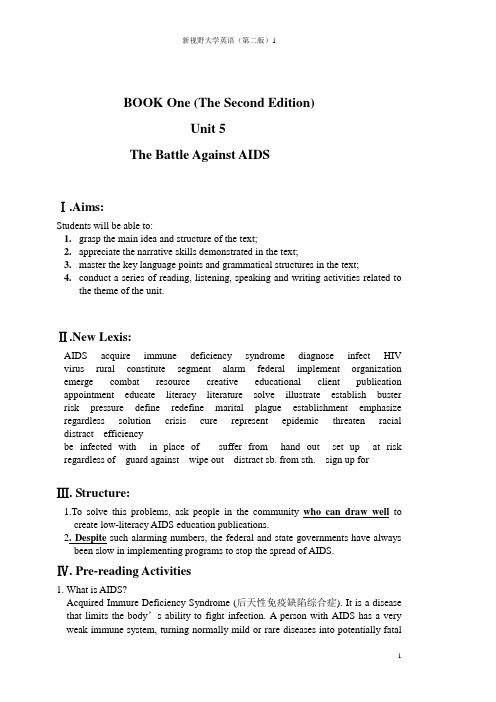
BOOK One (The Second Edition)Unit 5The Battle Against AIDSⅠ.Aims:Students will be able to:1.grasp the main idea and structure of the text;2.appreciate the narrative skills demonstrated in the text;3.master the key language points and grammatical structures in the text;4.conduct a series of reading, listening, speaking and writing activities related tothe theme of the unit.Ⅱ.New Lexis:AIDS acquire immune deficiency syndrome diagnose infect HIV virus rural constitute segment alarm federal implement organization emerge combat resource creative educational client publication appointment educate literacy literature solve illustrate establish buster risk pressure define redefine marital plague establishment emphasize regardless solution crisis cure represent epidemic threaten racial distract efficiencybe infected with in place of suffer from hand out set up at risk regardless of guard against wipe out distract sb. from sth. sign up forⅢ. Structure:1.To solve this problems, ask people in the community who can draw well tocreate low-literacy AIDS education publications.2. Despite such alarming numbers, the federal and state governments have alwaysbeen slow in implementing programs to stop the spread of AIDS.Ⅳ. Pre-reading Activities1. What is AIDS?Acquired Immure Deficiency Syndrome (后天性免疫缺陷综合症). It is a disease that limits the body’s ability to fight infection. A person with AIDS has a very weak immune system, turning normally mild or rare diseases into potentially fatalconditions.2. What is HIV?Human Immunodeficiency Virus (人类免疫缺陷病毒). AIDS is different from HIV in that the former usually causes death while HIV may lead to AIDS.3. What do you know about World AIDS Day?December,1st was established as World AIDS Day in 1988. It is the international day of coordinate action (协调行动) against AIDS.4. How many ways can HIV spread?contact with infected bloodmother-to-childsex5. Who is most likely to become infected?Anyone can become infected with HIV. HIV is transmitted sexually or through drug use by contaminated blood.Ⅴ. Background Information:What does the Red Ribbon stand for?It is an international symbol (标志) of AIDS awareness. People wear the ribbon, particularly around World AIDS Day, to show care and concern (关注) about HIV and AIDS.What We Still Don’t Know About AIDSIn the 20years since the first cases of AIDS were detected, scientists say they have learned more about this viral1) disease than any other.Yet Peter Piot, who directs the United Nations AIDS program, and Stefano Vella of Rome, president of the International AIDS Society, and other experts say reviewing unanswered questions could prove useful as a measure of progress for AIDS and other diseases.Among the important broader scientific questions that remain:Why does AIDS predispose infected persons to certain types of cancer and infections?A long-standing belief is that cancer cells constantly develop and are held in check by a healthy immune2) system. But AIDS has challenged that belief. People with AIDS are much more prone3) to certain cancers like non-Hodgkins lymphomas and Kaposi‟s sarcoma4), but not to breast, colon and lung, the most common cancersin the United States. This pattern suggests that an impaired immune system, at least the type that occurs in AIDS, does not allow common cancers to develop.What route does HIV take after it enters the body to destroy the immune system?When HIV is transmitted sexually, the virus must cross a tissue barrier to enter the body. How that happens is still unclear. The virus might invade directly or be carried by a series of different kinds of cells.Eventually HIV travels through lymph5) vessels6) to lymph nodes and the rest of the lymph system. But what is not known is how the virus proceeds to destroy the body‟s CD-4cells that are needed to combat invading infectious agents.How does HIV subvert the immune7) sys-tem?Although HIV kills the immune cells sent to kill the virus, there is widespread variation in the rate at which HIV infected people become ill with AIDS. So scientists ask:Can the elements of the immune system responsible for that variability be identified?If so, can they be used to stop progression to AIDS in infected individuals and possibly prevent infection in the first place?What is the most effective anti-HIV therapy?In theory, early treatment should offer the best chance of preserving immune function. But the new drugs do not completely eliminate HIV from the body so the medicines, which can have dangerous side effects, will have to be taken for a lifetime and perhaps changed to combat resistance. The new policy is expected to recommend that treatment be deferred until there are signs the immune system is weakening.Is a vaccine8) possible?There is little question that an effective vaccine is crucial to controlling the epidemic9). Yet only one has reached the stage of full testing, and there is wide controversy over the degree of protection it will provide. HIV strains that are transmitted in various areas of the world differ genetically. It is not known whether a vaccine derived from one type of HIV will confer protection against other types.In the absence of a vaccine, how can HIV be stopped?Without more incisive10), focused behavioral research, prevention messages alone will not stop the global epidemic.StageⅠPresentationA.Vocabulary1. acquire vt.get by skill or ability, by one‟s own efforts or behavior(由技术、能力、努力或行为而)获得;学到acquire a good knowledge of English 熟谙英文acquire a reputation for dishonesty 蒙上不诚实恶名acquire a taste for brandy 养成喝白兰地的嗜好2. immune: abe immune to sth. /sb 对….有免疫力;不受….影响This blood test will show whether or not you‟re immune to the disease.这次验血将表明你对这种病是否有免疫力。
新视野大学英语第三版第一册Unit5教案五篇范文
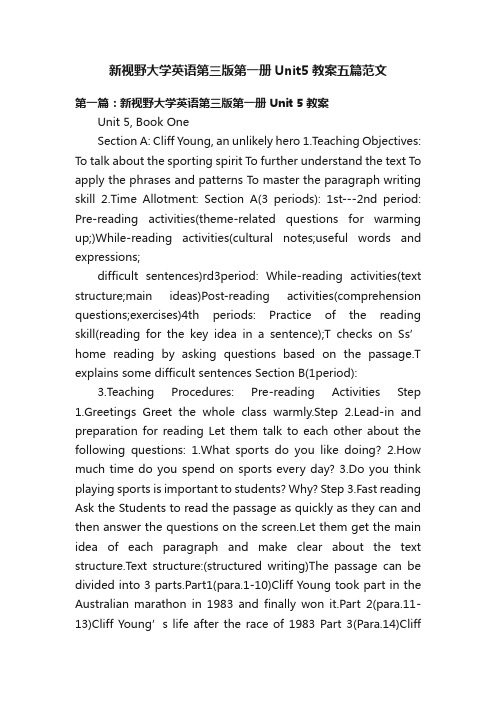
新视野大学英语第三版第一册Unit5教案五篇范文第一篇:新视野大学英语第三版第一册Unit 5教案Unit 5, Book OneSection A: Cliff Young, an unlikely hero 1.Teaching Objectives: To talk about the sporting spirit To further understand the text To apply the phrases and patterns T o master the paragraph writing skill 2.Time Allotment: Section A(3 periods): 1st---2nd period: Pre-reading activities(theme-related questions for warming up;)While-reading activities(cultural notes;useful words and expressions;difficult sentences)rd3period: While-reading activities(text structure;main ideas)Post-reading activities(comprehension questions;exercises)4th periods: Practice of the reading skill(reading for the key idea in a sentence);T chec ks on Ss’ home reading by asking questions based on the passage.T explains some difficult sentences Section B(1period):3.Teaching Procedures: Pre-reading Activities Step 1.Greetings Greet the whole class warmly.Step 2.Lead-in and preparation for reading Let them talk to each other about the following questions: 1.What sports do you like doing? 2.How much time do you spend on sports every day? 3.Do you think playing sports is important to students? Why? Step 3.Fast reading Ask the Students to read the passage as quickly as they can and then answer the questions on the screen.Let them get the main idea of each paragraph and make clear about the text structure.Text structure:(structured writing)The passage can be divided into 3 parts.Part1(para.1-10)Cliff Young took part in the Australian marathon in 1983 and finally won it.Part 2(para.11-13)Cliff Young’s life after the race of 1983 Part 3(Para.14)CliffYoung sets a good example for other people.Purpose: Improve the students’ reading and writing ability and und erstand the general idea of each paragraph.Method: Read the text individually and talk in groups;Use task-based language teaching method, reading approach, communicative approach and total physical response method.Step 4.Preparation for details of the text on the screen Students are required to look at the Words and Phrases on the screen and give a brief presentation in class.Words and Phrases:Purpose: Train the Students’ ability of understanding and using foreign language.Method: Talk in groups, Use task-based language teaching method, communicative approach and total physical response method.1.(Para.1)up to 达到;至多The Olympic Stadium will hold up to 80,000 spectators.奥林匹克体育场将可容纳多达8万观众。
unit five 教案
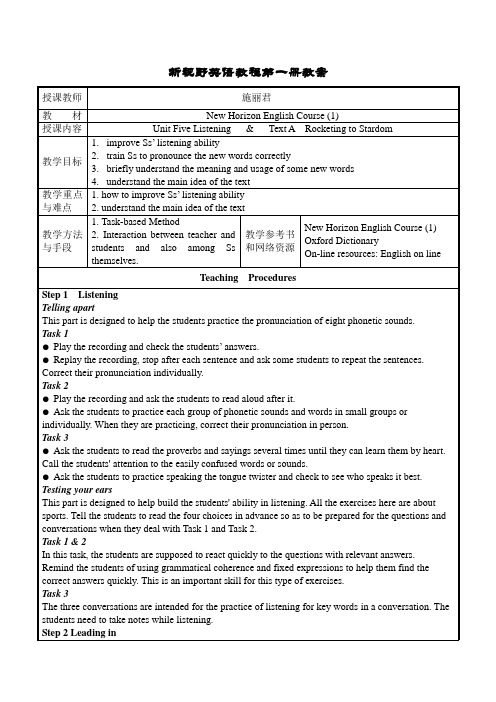
NBA draft refers to a procedure that started in 1947 whereby new or existing sports players are made available for selection or reselection by the teams in a league, usually with the earlier choices being given to the weaker teams during the annual selection process. No. 1 draft pick means the first player selected by a sports team.
教学参考书和网络资源
New Horizon English Course (1)
OxfordDictionary
On-line resources: English on line
Teaching Procedures
Step 1 Review
The teacher begins with the assignment mainly to have a review of the functional and notional language the students picked up in the previous class.
Step 2 Leading in
Topic: I love this game!
Sports are part of life, and sports can build yourself up physically and psychologically, whether you play well or not. Just enjoy sports and thus enjoy excellent health—which will bring a bright future!
新视野第一册第五单元导入
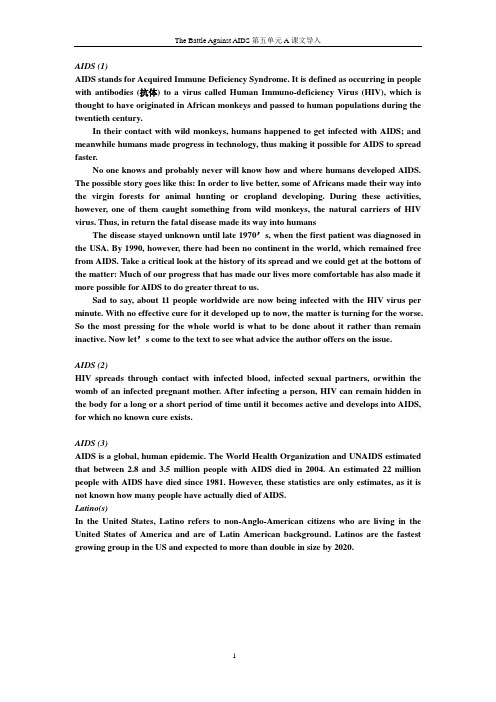
AIDS (1)AIDS stands for Acquired Immune Deficiency Syndrome. It is defined as occurring in people with antibodies (抗体) to a virus called Human Immuno-deficiency Virus (HIV), which is thought to have originated in African monkeys and passed to human populations during the twentieth century.In their contact with wild monkeys, humans happened to get infected with AIDS; and meanwhile humans made progress in technology, thus making it possible for AIDS to spread faster.No one knows and probably never will know how and where humans developed AIDS. The possible story goes like this: In order to live better, some of Africans made their way into the virgin forests for animal hunting or cropland developing. During these activities, however, one of them caught something from wild monkeys, the natural carriers of HIV virus. Thus, in return the fatal disease made its way into humansThe disease stayed unknown until late 1970’s, when the first patient was diagnosed in the USA. By 1990, however, there had been no continent in the world, which remained free from AIDS. T ake a critical look at the history of its spread and we could get at the bottom of the matter: Much of our progress that has made our lives more comfortable has also made it more possible for AIDS to do greater threat to us.Sad to say, about 11 people worldwide are now being infected with the HIV virus per minute. With no effective cure for it developed up to now, the matter is turning for the worse. So the most pressing for the whole world is what to be done about it rather than remain inactive. Now let’s come to the text to see what advice the author offers on the issue.AIDS (2)HIV spreads through contact with infected blood, infected sexual partners, orwithin the womb of an infected pregnant mother. After infecting a person, HIV can remain hidden in the body for a long or a short period of time until it becomes active and develops into AIDS, for which no known cure exists.AIDS (3)AIDS is a global, human epidemic. The World Health Organization and UNAIDS estimated that between 2.8 and 3.5 million people with AIDS died in 2004. An estimated 22 million people with AIDS have died since 1981. However, these statistics are only estimates, as it is not known how many people have actually died of AIDS.Latino(s)In the United States, Latino refers to non-Anglo-American citizens who are living in the United States of America and are of Latin American background. Latinos are the fastest growing group in the US and expected to more than double in size by 2020.Problem-Solution-Evaluation问题解决法Making a Good Speech in PublicWe may carry about within ourselves the desire to make a good speech in public. (T opic) But many of us lack self-confidence to make it as wished. (Problem) T o get over the barrier, we need to build up the courage to speak in front of others, such as answering questions in class and introducing ourselves to a group of strangers. Then, we need to enrich ourselves with knowledge about what to be talked about as well as the art of delivering a speech. in public. We need to put ourselves in the shoes of the public so as to know what we give will hold their interest. In brief, where there is a good preparation in advance, there is much chance of success in giving such a speech with confidence. (Solution) In the end, more than we expect, we may discover in ourselves greater talents and confidence still unknown to us. (Evaluation)。
- 1、下载文档前请自行甄别文档内容的完整性,平台不提供额外的编辑、内容补充、找答案等附加服务。
- 2、"仅部分预览"的文档,不可在线预览部分如存在完整性等问题,可反馈申请退款(可完整预览的文档不适用该条件!)。
- 3、如文档侵犯您的权益,请联系客服反馈,我们会尽快为您处理(人工客服工作时间:9:00-18:30)。
S implistic Lesson Plan for Unit 5 ( Preband Book 1)Accompanied by HandoutsAIMS: a) To have the class learn to use key words and expressionsb) To have them learn key structures by heartc) To have them master the writing techniques of this unitd) To help them to develop one important reading skillLANGUAGE POINTS: (See handouts )NEW STRUCTURE: 1) Sb. can/could/be able to afford sth./to do sth.2) Was trying to find the right thing to eat difficult?3). Sb. spend sometime in doing sth./on sth./with sb. READING SKILL: --- Identifying supporting detailsSPOTLIGHT ON GRAMMAR:不带to的不定式PROCEDURE:Warm-up: Pre-reading activities by listening to a passage related to the text and then answering some questionsStage 1, presentation and the explanation of the new words and the expressions Stage 2, discussion on the passage concerning “Too Many Choices in Shopping”Stage 3, review of the above by finishing the exercises, including those about the content of the passage and about the language pointsStage 4, practicing the reading skill by reading section BHandoutsI.Structure of the textPart I — (Paras. 1)Part I It introduces an idea that too many choices today may not be a good thing.Part II — (Paras. 2-3 )Part II Facing a variety of choices, some think it pleasant.Part III— (Paras. 4-8)Part III Some others think too many choices a big problem.Part IV — (Paras. 9)Part IV The function of Kress’s program.II.Main idea of the passageThe passage talks about the advantages and disadvantages of facing too many choices in shopping. Cons and Pros of it both exist among different people groups. However, shoppers need to keep a clear mind but not to be disturbed by variety of choices.III. Language pointsPractical Phrases1.report vt. & n.vt. write about sth. that has happened报道---It was reported that the great artist would come to our city and give lectures in several colleges.n. C sth. written for what has happened报告;报道---Did you read the newspaper reports about the accident?2. call v. & n.v.a.give a name to 命名;称呼call + sb. +宾语补语---His name is Li Hua but we all call him A-hua.---They called the baby Tom/b. say or think that sb. or sth. is认为……是;把……称为---People called him a hero for what he did.c. telephone sb. 给某人打电话---I’ll call you later. ---Who is calling?n.a.cry 呼声,叫声b.通话(电话)---a telephone call3. continue v.a. go on doing or happening连续;继续---We continued singing until 5 o’clock.b.start again after a break(中断后)再开始---Let’s have a rest now and continue the text next class.4. remember vi. &vt.a. keep sth. in one’s mind; call back to mind记得;想起---I couldn’t remember ever seeing the singer on TV.b. think about with special respect or honor纪念---I want you to have it. Keep it to remember us both.c. send good wishes to sb.向……问好---Please remember me to your wife.Note: remember doing sth. 记得做过某事;而remember to do sth.指记得去做某事。
类似的词还有forget, regret5. spend vt.a. use time for sth.花时间,度过---He wanted to spend his holidays with her.---Jay spent half a year on his new record.---Jay spent half a year preparing his new record.c.give out money in payment花钱---Girls always spend a lot of money on their clothes.比较spend take cost1)spend既可以指花时间,也可以指花钱,主语是人2)take 可指花费,消耗时间、劳力等,主语一般是事情或it ---It took us two days to finish the work.3) cost(cost, cost) 多指花钱,引申可以指花时间、精力等---The bike/MP3 cost him 200/1000 yuan.---The program/plan cost much time and patience.6. save v.a. take sb. away from danger救;挽救---They tried their best to save the little boy from the river.b. keep sth., esp. money, to use later储蓄---If you save now, you will be able to buy a new bike soon.c. use less of sth. 节省---This method will save us much time.Functional Patterns1. The newspaper ...who traded in death...(Para1)trade in: buy and sell---They trade in food, drinks and many other things.trade v. & n.v. 1)互换,交易2)做生意---China trades with many different countriesn. 1) 贸易,买卖2)行业---trade union2. In fact, Alfred Nobel’s...(Para1)in fact: as a matter of fact实际上,其实---In fact, it turned out to be much better than we had thought.3. Alfred Nobel put down the newspaper sadly.(Para2)put down: place sth. down---Put down your books please.4. All the same, ...(Para2)all the same: even so, still尽管如此,仍然--None of them understand his words, but they nodded all the same.5. He did not like that idea at all.(Para2)not ... at all: not in any way 一点也不,丝毫也不---She doesn’t like the house at all.Not at all. 回答对方表示感谢的客套话,“别客气”相当于You are welcome.6. Many people of his day...(Para3)of one’s day: of one’s age某人所处的时代---He was well-known among those artists of his day.7. Nobel was worried about the way...(Para4)be worried about: be anxious about 为......担心,为......发愁---She was worried about her mother’s health.8. He wanted to think of the best way to...(Para4)think of1)想到---Please think of a word beginning with A.2)思考,考虑/想,打算---I’m thinking of going to Beijing.think about考虑;仔细考虑;审查---Please think about the suggestion and tell me your views tomorrow.think over仔细想,审慎思考---Think it over.9. They were very surprised...learned of Alfred Nobel’s plan...(Para5)learn of: become informed of获悉,得知,了解---He will learn of his mother’s death at the end.10. ...as a result finally...(Para6)as a result: caused or produced by sth. else 作为结果,结果是---It was raining cats and dogs yesterday. As a result, many students were absent from class.as a result of sth. 作为......的结果,因为because of---Many students were absent from class as a result of the heavy rain.IV. Review the important phrases and expressions in text1 并非好事too much of a good thing2 厌倦了某事be tired of sth3 纷至沓来on the way4 感觉大脑锈钝了mind is dead5 健身器材body-building equipment6 探究问题的根源get to the root of problemsSection B:Advertising EverywhereI Reading SkillsIdentifying supporting details(1).II Text InstructionLanguage points1. In the advertising industry, selling products is the most important goal. advertise: v. make sth, known to the public, eap. In newspaper or on TV 做广告---The job was ~d in the local newspaper.---They ~d their goods in several different ways.advertising:n. [U] the business of encouraging people to buy goods by means of advertisements广告业---I’m looking for a job in ~.---The newspaper gets a lot of money from ~.4. So the best advertisement in the world means nothing if the product is notsuitable for the market.(Para.4)suitable: a. of the right type; fitting---Do you think you’re ~ for the job.---These topics are ~ for writing.suit: vt.1)look attractive on sb.---This dress really suits you.2)be right for sb.---Living in the country wouldn’t suit her at all.5. …find Chinese food provided on the menu.(Para.4)provide: vt. give, offer, or supply---We should ~ the children with a good education.---This book will ~ you with all the information you need.---We planned to ~ some pictures and books for the students.Note: provide的固定搭配一般为~ sb. with sth.或~ sth. for sb.iii) Assignments。
